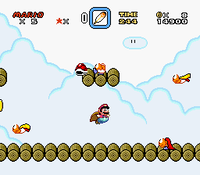Bridge: Difference between revisions
m (Text replacement - "{{[Mm]ore images" to "{{image|more=yes") |
|||
| Line 44: | Line 44: | ||
|JapR=Hashi | |JapR=Hashi | ||
|JapM=Bridge | |JapM=Bridge | ||
|Ita=Ponte | |||
|ItaM=Bridge | |||
}} | }} | ||
{{SMB}} | {{SMB}} | ||
Revision as of 05:43, July 24, 2024
It has been requested that this article be rewritten and expanded to include more information. Reason: include information on all of the New Super Mario Bros. games
It has been requested that more images be uploaded for this article. Remove this notice only after the additional images have been added. Specifics: Super Mario Bros./Lost Levels and Super Mario Bros. 3 appearances
- This article is about the recurring platform in the Super Mario series. For the skeletal bridge from New Super Mario Bros. U, see bridge (New Super Mario Bros. U). For the blocks also known as bridges, see road.
Bridges are a kind of Semisolid Platform in the Super Mario games. They first appear in Super Mario Bros.
History
Super Mario Bros. / Super Mario Bros.: The Lost Levels
In Super Mario Bros. and Super Mario Bros.: The Lost Levels, bridges appear in every boss battle. Mario or Luigi can defeat Bowser or his impostors by touching the ax, which will sever the bridge and cause him to fall into lava.
A different type of bridge appear in Worlds 2-3 and 7-3 of Super Mario Bros. and Worlds 1-3, 2-3, 6-3, and C-2 of The Lost Levels. Cheep Cheeps jump out of thin air underneath the bridges in these levels. While the same type of bridge appears in World 3-1 of Super Mario Bros. and World 2-1 of The Lost Levels, Cheep Cheeps do not arise from under them, but are occupied by other enemies.
Super Mario Bros. 3
Bridges return in Super Mario Bros. 3, in which they first appear at the end of World 3-8. They are typically blue, but are gray in castle stages and the Hand Traps. In the Super Mario All-Stars version, however, all bridges are made yellow instead.
Super Mario World
Bridges reappear in Super Mario World, where they come in two different varieties. Log bridges solely appear in the Twin Bridges area, specifically in Butter Bridge 1, Butter Bridge 2, and the Cheese Bridge Area. They are joined by yellow bridges that look closer to the bridges in the previous games, and these bridges appear predominantly in Coin Heavens as well as #5 Roy's Castle and Bowser's Castle.
While the yellow bridges are completely solid as they have been in previous games, log bridges are semisolid instead; this would be adopted for all bridges in future games.
New Super Mario Bros.
Bridges appear again in New Super Mario Bros. They first appear in World 1-2, appearing only twice at the beginning of the level. They then appear in Template:World-link, appearing almost everywhere in the level. They also appear in World 1-4, World 2-1, and World 2-3, as well as the rest of the tower levels.
New Super Mario Bros. 2
Bridges appear again in New Super Mario Bros. 2. They first appear in World 1-2, then appear occasionally afterwards. They always appear in the tower levels.
Super Mario Maker / Super Mario Maker for Nintendo 3DS / Super Mario Maker 2
Bridges return as a placeable part in Super Mario Maker, Super Mario Maker for Nintendo 3DS, and Super Mario Maker 2. They are found in the terrain section in the Course Maker in all styles except for the Super Mario 3D World style. Bridges act like Semisolid Platforms, except that no other terrain object can overlap them. In the Course Maker, the player can extend or retract the bridge to a minimum of three tiles or a maximum of around twenty tiles. When placed, it is set to its shortest length by default. In the Super Mario World style in the Ground, Desert, Sky, Snow, and Forest themes, they look like log bridges. In any other theme of that style, they look like normal bridges. In the New Super Mario Bros. U style, bridges have many colors, but in the Super Mario Bros. 3 style, every bridge is the same.
Gallery
Bridges in Template:World-link of New Super Mario Bros.
Bridges in World 5-2 of New Super Mario Bros. Wii
Bridges in Template:World-link of New Super Mario Bros. 2
Bridges in Freezing-Rain Tower, from New Super Mario Bros. U
Bridges in Bramball Woods, from New Super Mario Bros. U Deluxe
The only bridge color for the Super Mario Bros. 3 style in Super Mario Maker 2
Names in other languages
| Language | Name | Meaning | Notes |
|---|---|---|---|
| Italian | Ponte[?] | Bridge |





